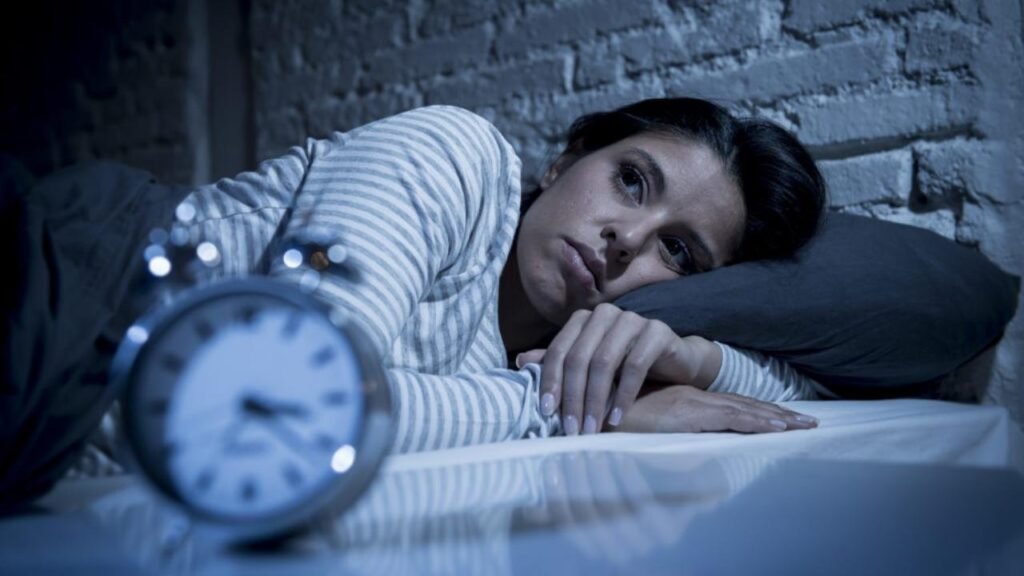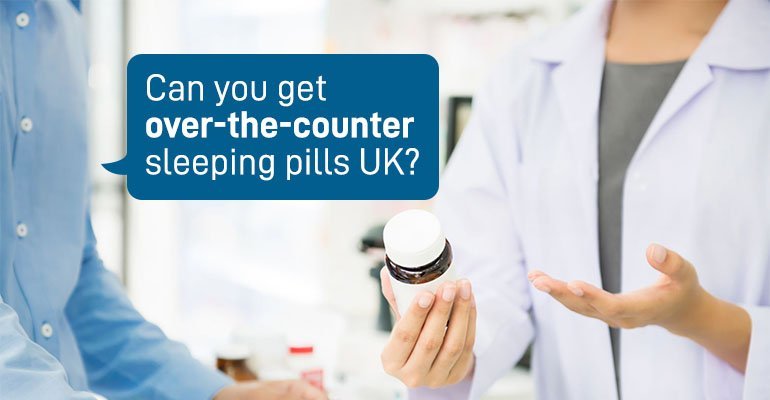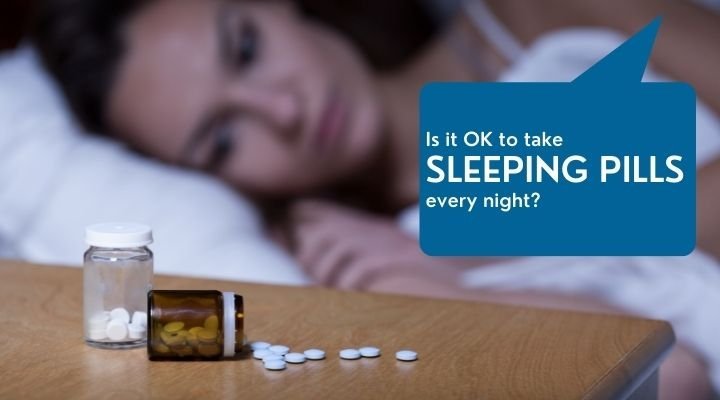Yes. Insomnia can cause high blood pressure over time. Poor sleep disrupts your body’s natural blood pressure regulation, increases stress hormone levels, and keeps your nervous system in a constant state of alert—raising your risk of developing hypertension.
Introduction: Sleepless Nights, Silent Danger
We often think of insomnia as a frustrating inconvenience—something that makes us tired, irritable, or unable to focus. But what if insomnia is doing more damage than you think? What if your restless nights are slowly pushing your blood pressure higher, increasing your risk for serious heart conditions?
If you’ve ever asked, “Can insomnia cause high blood pressure?” — you’re not alone. With millions struggling to sleep every night, it’s important to understand how your sleep habits directly affect your heart health.
Let’s dive deep into this hidden connection—and learn how to break the cycle.
What is Insomnia?
Insomnia is a sleep disorder that makes it difficult to fall asleep, stay asleep, or wake up feeling rested—even when you’ve had the chance to sleep. It can be short-lived or become a long-term health issue.
Types of Insomnia:
| Type | Description |
|---|---|
| Acute Insomnia | Short-term, usually caused by stress or lifestyle changes |
| Chronic Insomnia | Lasts 3 nights a week for 3+ months, often linked to medical or mental health issues |
| Onset Insomnia | Trouble falling asleep |
| Maintenance Insomnia | Waking up during the night and having difficulty going back to sleep |
Common Symptoms:
- Lying awake for hours at night
- Waking up too early
- Daytime fatigue and low energy
- Poor concentration
- Mood swings or irritability
Also Read: Is It OK to Take Zopiclone Every Night?
What is High Blood Pressure (Hypertension)?
High blood pressure, also called hypertension, occurs when the force of blood pushing against your artery walls is consistently too high. Over time, this pressure damages blood vessels and organs like the heart, kidneys, and brain.
Blood Pressure Levels Chart:
| Category | Systolic (Top Number) | Diastolic (Bottom Number) |
|---|---|---|
| Normal | Less than 120 | Less than 80 |
| Elevated | 120–129 | Less than 80 |
| Hypertension Stage 1 | 130–139 | 80–89 |
| Hypertension Stage 2 | 140+ | 90+ |
Untreated hypertension is known as the “silent killer” because it often has no symptoms until a serious event like a heart attack or stroke occurs.
How Are Insomnia and High Blood Pressure Connected?
There’s growing scientific evidence that poor sleep quality and high blood pressure are closely linked. Here’s how insomnia contributes to hypertension:
1. Increased Stress Hormones (Cortisol & Adrenaline)
When you don’t sleep enough, your body releases stress hormones that prepare it for “fight or flight.” These hormones raise your heart rate and blood pressure, even while you’re resting.
2. Overactive Nervous System
Chronic insomnia keeps your sympathetic nervous system switched on. This constant alertness constricts blood vessels and increases blood pressure.
3. Disruption of Nocturnal Blood Pressure Drop
Normally, your blood pressure dips by 10–20% during sleep. If you don’t sleep enough, this dip doesn’t happen—leading to sustained high blood pressure.
4. Increased Inflammation & Oxidative Stress
Poor sleep promotes inflammation and oxidative stress, both of which contribute to damage inside your arteries—raising hypertension risk.
Also Read: How to Safely Use Zopiclone for Insomnia Relief
How Insomnia Affects Overall Health
| Body System | Effect of Insomnia | Related Health Risks |
|---|---|---|
| Cardiovascular | Increased blood pressure, heart rate | Hypertension, heart disease, stroke |
| Nervous System | Overactivity of stress response | Anxiety, depression, impaired memory |
| Immune System | Weakened defenses | Higher risk of infections |
| Endocrine System | Hormonal imbalance | Diabetes, weight gain |
| Digestive System | Poor metabolism | Acid reflux, poor digestion |
Scientific Evidence: What Studies Say
Several research studies confirm the link between insomnia and high blood pressure:
- American Heart Association (AHA): Found that short sleep (under 6 hours/night) significantly increases the risk of developing hypertension.
-
Journal of Hypertension: People with chronic insomnia had a 300% higher risk of high blood pressure compared to those with healthy sleep habits.
- Sleep Medicine Reviews: Highlighted how sleep restriction leads to poor cardiovascular regulation, raising BP levels.
Who’s Most at Risk?
| Risk Group | Why They’re Vulnerable |
|---|---|
| Older Adults | Sleep becomes lighter with age; blood vessels lose elasticity |
| Women | Hormonal changes from PMS, pregnancy, menopause can trigger insomnia |
| Shift Workers | Disrupted sleep patterns raise blood pressure and cortisol |
| People with Mental Health Issues | Anxiety and depression worsen both sleep and blood pressure |
| Individuals with Sleep Apnea | This condition directly increases hypertension risk |
Warning Signs: When to Be Concerned
If you notice the following signs along with insomnia, your blood pressure may be rising:
- Frequent morning headaches
- Racing heart at night
- Feeling tired but unable to relax
- Chest tightness or palpitations
- Blurry vision or dizziness
- Constant fatigue, even after sleep
How to Manage Insomnia and Control Blood Pressure
Here’s the good news: Treating insomnia can help lower blood pressure and protect your heart. Here’s how:
1. Improve Sleep Hygiene
- Stick to a regular sleep schedule
- Limit caffeine, nicotine, and alcohol after 6 PM
- Keep your bedroom dark, cool, and quiet
- Avoid screens (phone, TV, laptop) 1 hour before bed
2. Try Relaxation Techniques
- Deep breathing: Inhale for 4 seconds, hold for 7, exhale for 8
- Progressive muscle relaxation
- Guided meditation or calming music
- Aromatherapy with lavender or chamomile
3. Exercise Regularly
- Aim for 30 minutes of light to moderate activity (walking, yoga, cycling)
- Improves sleep quality and helps lower blood pressure
- Avoid intense workouts late at night
4. Consider Professional Help
- CBT-I (Cognitive Behavioral Therapy for Insomnia): Gold-standard, non-drug treatment
- Sleep specialist or cardiologist may recommend diagnostic tests or therapy
- In some cases, short-term sleep medications may be considered
5. Natural Remedies (Use With Doctor’s Advice)
| Remedy | Benefit |
|---|---|
| Melatonin | Regulates sleep-wake cycles |
| Magnesium | Helps muscles relax and lowers blood pressure |
| Chamomile tea | Natural sedative and anti-anxiety |
| Valerian root | Herbal supplement for better sleep |
Frequently Asked Questions (FAQs)
Q1: Can insomnia directly cause high blood pressure?
Yes. Chronic insomnia increases stress hormone levels and prevents nighttime blood pressure dipping, which over time leads to hypertension.
Q2: Does fixing my sleep lower my blood pressure?
Absolutely. Improving sleep habits or treating insomnia with therapy can help reduce high blood pressure and improve heart health.
Q3: How many hours of sleep should I get to prevent high blood pressure?
Experts recommend 7–9 hours of quality sleep per night for adults to maintain healthy blood pressure.
Q4: Do sleeping pills help lower blood pressure?
Sleeping pills may help with insomnia short-term but don’t treat the root cause. Use them under a doctor’s supervision, and focus on long-term behavioral changes.
Conclusion: Sleep Smart, Live Strong
Insomnia is more than just a bad night—it’s a health risk with real consequences. Poor sleep not only drains your energy but can silently raise your blood pressure, increasing your chances of heart attack, stroke, and other cardiovascular issues.
The connection between insomnia and high blood pressure is strong—but the solution starts with you. Whether it’s building a healthy sleep routine, managing stress, or seeking help from a sleep specialist, taking action today can protect your heart for years to come.
Sleep isn’t a luxury—it’s a lifesaver.
Start treating it like one.
Also Read: Does Zopiclone Cause Memory Loss? Understanding the Risks and Effects





